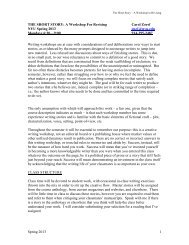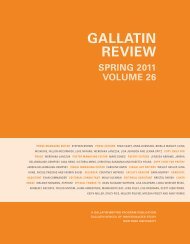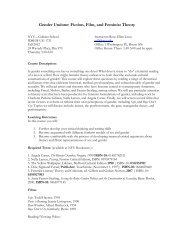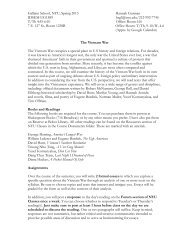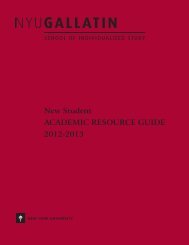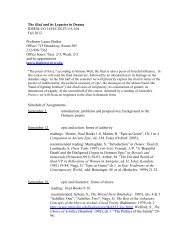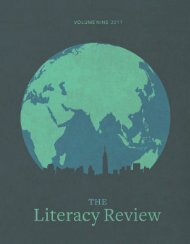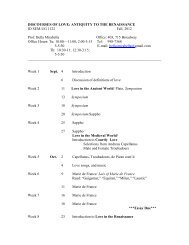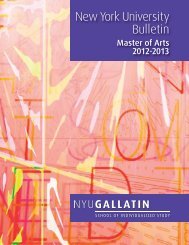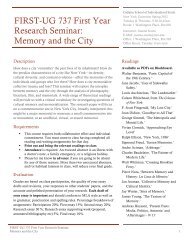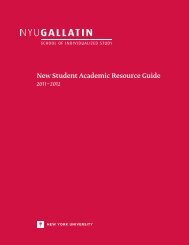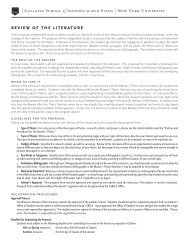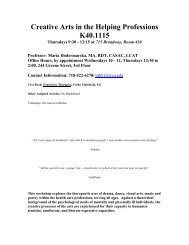Foucault: Discourse, Power, and Cares of the Self - Gallatin School ...
Foucault: Discourse, Power, and Cares of the Self - Gallatin School ...
Foucault: Discourse, Power, and Cares of the Self - Gallatin School ...
You also want an ePaper? Increase the reach of your titles
YUMPU automatically turns print PDFs into web optimized ePapers that Google loves.
GALLATIN SCHOOL OF INDIVIDUALIZED STUDYNEW YORK UNIVERSITY<strong>Foucault</strong>:<strong>Discourse</strong>, <strong>Power</strong>, <strong>and</strong> <strong>Cares</strong> <strong>of</strong> <strong>the</strong> <strong>Self</strong>Course IDSEM-UG 1339 Spring 2013194 Mercer #305 Tues 3:30-6:10Bradley Lewis, MD, PhDPhone: 212-998-7313, email: bl466@nyu.eduOffice: 1 Washington Place #609Office hours (please schedule in advance):Tues (2:00 to 3:30), Thursday (2:00 to 3:30), <strong>and</strong> Friday (1:00 to 3:00)<strong>Discourse</strong>:I have always been interested in <strong>the</strong> problem <strong>of</strong> <strong>the</strong> relationship between subject <strong>and</strong>truth. I mean, how does <strong>the</strong> subject fit into a certain game <strong>of</strong> truth? The first problem Iexamined was … how… <strong>the</strong> mad subject [was] placed in this game <strong>of</strong> truth defined by amedical model.<strong>Power</strong>:That sent me back to <strong>the</strong> problem <strong>of</strong> institutions <strong>of</strong> power… The word power…is simply ashort h<strong>and</strong> for <strong>the</strong> expression I generally use: relations <strong>of</strong> power.<strong>Cares</strong> <strong>of</strong> <strong>the</strong> <strong>Self</strong>:If I am now interested in how <strong>the</strong> subject constitutes itself in an active fashion throughpractices <strong>of</strong> <strong>the</strong> self, <strong>the</strong>se practices are never<strong>the</strong>less not something invented by <strong>the</strong>individual himself. They are models that he finds in his culture <strong>and</strong> are proposed,suggested, imposed upon him by his culture, his society, <strong>and</strong> his social group.Ethics <strong>of</strong> <strong>the</strong> Concern for <strong>Self</strong> as a Practice <strong>of</strong> Freedom (1984)Course OverviewFrench philosopher <strong>and</strong> cultural historian Michel <strong>Foucault</strong>’s innovative approachto knowledge, power, <strong>and</strong> subjectivity anticipated a new form <strong>of</strong> "bio-politics" that hasbeen broadly influential across <strong>the</strong> academy: in humanities, cultural studies, queer <strong>the</strong>ory,<strong>and</strong> political activism (particularly ACT-UP politics). <strong>Foucault</strong>’s later work on care <strong>of</strong> <strong>the</strong>self was devoted to underst<strong>and</strong>ing philosophy as a way <strong>of</strong> life, a spiritual exercise, <strong>and</strong> apractice <strong>of</strong> freedom. This work has opened up new ways <strong>of</strong> thinking about ancientphilosophy, religious studies, <strong>and</strong> spiritual practices. And, most recently, <strong>the</strong> after-life <strong>of</strong><strong>Foucault</strong>’s work has been inspirational for post-anarchist forms <strong>of</strong> prefigurative politics(such as Occupy Wall Street). In view <strong>of</strong> this influence, we devote this class to closereadings <strong>of</strong> <strong>Foucault</strong>’s work <strong>and</strong> his key concepts.1
TextsSamuel BeckettMichel <strong>Foucault</strong>Michel <strong>Foucault</strong>Michel <strong>Foucault</strong>Michel <strong>Foucault</strong>Paul Rabinow<strong>and</strong> Nikolas RoseDavid HalperinPierre HadottWaiting for GodotMadness <strong>and</strong> CivilizationBirth <strong>of</strong> <strong>the</strong> ClinicDiscipline <strong>and</strong> PunishmentHistory <strong>of</strong> SexualityThe Essential <strong>Foucault</strong>Saint <strong>Foucault</strong>Philosophy as a Way <strong>of</strong> Life: Spiritual Exercises fromSocrates to <strong>Foucault</strong>Class ScheduleDISCOURSE1.) Jan 29: IntroductionVideo: Waiting for Godot in Class (pt 1)2.) Feb 5: Waiting for Godot ContinuedBeckett: Waiting for GodotBoulder: Beckett: A Guide for <strong>the</strong> Perplexed (selections)Video: Waiting for Godot in Class (pt II)3.) Feb 12: History <strong>of</strong> MadnessSmart: <strong>Foucault</strong> Major Themes: p 18-26<strong>Foucault</strong>: The Historical Constitution <strong>of</strong> Mental Illness<strong>Foucault</strong>: Madness <strong>and</strong> Civilization (preface, Ch 2, 5—p117-135, 9, <strong>and</strong>conclusion)Andreason: History <strong>of</strong> PsychiatryDon McLean Interview: Why I had to Write ‘Vincent’ (with lyrics)Video: Vincent—Don McLean4.) Feb 19: Birth <strong>of</strong> <strong>the</strong> ClinicSmart: <strong>Foucault</strong> Major Themes: p 26-31<strong>Foucault</strong>: Birth <strong>of</strong> <strong>the</strong> Clinic: (preface, Ch 8, 9, <strong>and</strong> conclusion)Order <strong>of</strong> Things: Chinese Encyclopedia5.) Feb 26: Structural Linguistics2
Sturrock: Structuralism <strong>and</strong> Since (excerpts)Saussure: Course in General Linguistics (selections)Lewis: Dodging <strong>the</strong> Science Wars6.) March 5: <strong>Discourse</strong><strong>Foucault</strong>: The <strong>Discourse</strong> on LanguageLewis: The New Psychiatry as a Discursive Practice**Discuss First Paper: Due Next Class**Topic: Using <strong>the</strong> readings thus far, please draw out similarities <strong>and</strong> differencesbetween <strong>Foucault</strong> <strong>and</strong> Beckett.7.) Mar 12: Knowledge/<strong>Power</strong>**First Paper Due**<strong>Power</strong>POWER<strong>Foucault</strong>: Truth <strong>and</strong> <strong>Power</strong>Video: Noam Chomsky <strong>and</strong> Michel <strong>Foucault</strong>: Human Nature: Justice versusMar 19 (SPRING BREAK)8.) Mar 26: Disciplinary Society<strong>Foucault</strong>: Discipline <strong>and</strong> PunishmentPart I: TortureChapter 1: Body <strong>of</strong> <strong>the</strong> condemnedPart III: DisciplineChapter 1: Docile bodiesChapter 2: The means <strong>of</strong> correct trainingChapter 3: PanopticismPart IV: PrisonChapter 3: The Carceral9.) Apr 2: Sexuality <strong>and</strong> Biopower<strong>Foucault</strong>: History <strong>of</strong> Sexuality (p. 1-51) (p. 92-115 <strong>and</strong> 133-159)10.) Apr 9: ACT-UP <strong>and</strong> Queer PoliticsHalperin: Saint <strong>Foucault</strong>: Queer Politics <strong>of</strong> Michel <strong>Foucault</strong>3
Video: Act Up (middle <strong>of</strong> class)11.) April 16: Subject <strong>and</strong> Ethics<strong>Foucault</strong>: Technologies <strong>of</strong> <strong>the</strong> <strong>Self</strong><strong>Foucault</strong>: Subject <strong>and</strong> <strong>Power</strong><strong>Foucault</strong>: Genealogy <strong>of</strong> EthicsVideo: <strong>Foucault</strong>’s lecture12.) Apr 23: Philosophy as a Way <strong>of</strong> LifeCARES OF THE SELF<strong>Foucault</strong>: Hermeneutics <strong>of</strong> <strong>the</strong> Subject (lecture 1 <strong>and</strong> course sum p. 498-505)<strong>Foucault</strong>: Ethics <strong>of</strong> Concern as Practice <strong>of</strong> FreedomHaddot: Forms <strong>of</strong> Life <strong>and</strong> Forms <strong>of</strong> <strong>Discourse</strong> in Ancient PhilosophyHaddot: Spiritual ExercisesVideo: <strong>Foucault</strong>’s lecture continued13.) Apr 30: Philosophy as a Way <strong>of</strong> LifeHaddot: Marcus AureliusEpictitus <strong>and</strong> MarcusHaddot: Reflections on Cultivation <strong>of</strong> <strong>the</strong> <strong>Self</strong>Hadott: Philosophy as a Way <strong>of</strong> Life14.) May 7: <strong>Foucault</strong> <strong>and</strong> Post-Anarchism (LAST CLASS)Graeber <strong>and</strong> Grubacic: Anarchism or <strong>the</strong> Revolutionary Movement <strong>of</strong> <strong>the</strong> 21 stCenturyMay: Is Post-structuralist Political Theory Anarchist?Shepard: Introductory Notes on <strong>the</strong> Trail from ACT-UP to <strong>the</strong> WTODay: From Hegemony to Affinity: The Political Logic <strong>of</strong> <strong>the</strong> Newest SocialMovements***Final Paper due May 10 th by 5 PM in my box***Please discuss <strong>the</strong> three moments in <strong>Foucault</strong>’s work—<strong>Discourse</strong>, <strong>Power</strong>, <strong>and</strong><strong>Cares</strong> <strong>of</strong> <strong>the</strong> <strong>Self</strong>—<strong>and</strong> <strong>the</strong>ir implications for a post-anarchic politics.Course Requirements4
Grades are based on three parts: attendance/participation (20%) <strong>and</strong> 2 papers(40% each). Late papers are graded down. There will be an opportunity to rewrite <strong>the</strong>first paper if you desire. The attendance/participation grade is composed <strong>of</strong> weekly classattendance <strong>and</strong> participation.On <strong>the</strong> days we do not have a film or guest lecturer, class will begin with a shortlecture on <strong>the</strong> material for that week. We <strong>the</strong>n move to round robin class discussioninitiated by your selections from <strong>the</strong> material. To prepare for this part <strong>of</strong> <strong>the</strong> class pleasetype a quote which you have comments or questions from each week’s readings (includepage numbers so we can find your quotes). We will <strong>the</strong>n go around <strong>the</strong> class reading <strong>and</strong>discussing <strong>the</strong> quotes selected. Your quotes for each half <strong>of</strong> <strong>the</strong> class are turned in withyour papers.The papers are 7 pages type written, double spaced. Please use <strong>the</strong> material from<strong>the</strong> class to develop <strong>the</strong> topic question I h<strong>and</strong> out. Back up your <strong>the</strong>sis with arguments<strong>and</strong> examples from <strong>the</strong> class readings (include internal citations with page numbers <strong>and</strong> areference list at <strong>the</strong> end). A good paper demonstrates that you have integrated <strong>the</strong>material from <strong>the</strong> class discussions <strong>and</strong> readings <strong>and</strong> can use it to analyze your topic. Use<strong>the</strong> bulk <strong>of</strong> your energy reading closely <strong>and</strong> thinking seriously about <strong>the</strong> materials youhave (ra<strong>the</strong>r than doing outside research). Also, be sure <strong>and</strong> give your paper a title.The grading scale for <strong>the</strong> class will be as follows: 93-100% (A) 90-92 (A-), 87-89(B+), 83-86 (B), 80-82 (B-), 77-79 (C+), 70-76 (C), 63-69 (D), <strong>and</strong> below (F).5



